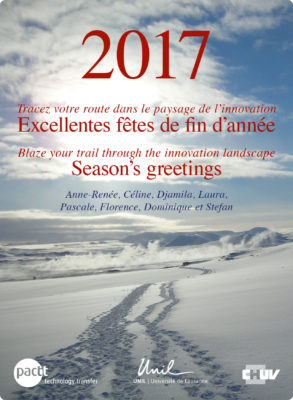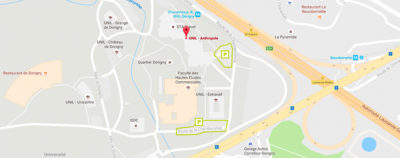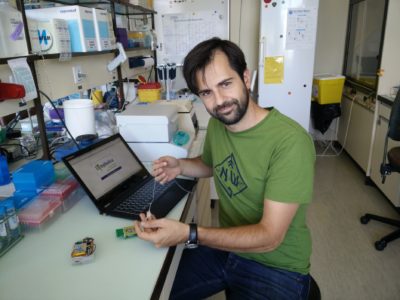News
The applications for two venture leaders programs are open
Venturelab, a swiss start-up Accelerator, has opened the applications for the following venture leaders programs :
Venture leaders Life Science (Boston), June 2017
For more information, please click here or download the flyer here.
Venture leaders China, July 2017
For more information, please click here download the flyer here.
Application deadline for both programs is March 5th, 2017.
The MassChallenge Switzerland applications 2017 are open
Since January 1st, Switzerland has regained the “Associated Country” status for the “Horizon 2020” EU Programme.
To read the complete newsletter from Euresearch, please click on the following link :
Protocole de Nagoya
Le Protocole de Nagoya négocié dans le cadre de la Convention sur la diversité biologique (CDB) régit l’accès aux ressources génétiques et le partage juste et équitable des avantages découlant de leur utilisation.
Read More
Season’s Greetings

Rencontrez les parcs d’innovation
Pas besoin d’être dans un technopôle pour bénéficier de l’ infrastructures et plateformes techniquement avancées des parcs d’innovations! »
Indépendamment de l’offre de bureaux et d’incubation, vous avez accès à des « outils » et compétences disponibles dans ces technopôles, sans nécessairement y être installé. Comme par exemple, utiliser une imprimante 3D métal pour du prototypage.
Présentation:
lundi 14 novembre 2016
Auditoire 1129 @ Anthropole
Université De LAUSANNE (UNIL)
Entrée libre mais inscription obligatoire.
PROGRAMME
Dès 17h30
Verre de bienvenue et remise des badges.
18h-19h
Présentation des technopôles:
Y-Parc, Biopôle, EPFL Innovation Park, Technopôle de Sainte-Croix,
TecOrbe et Ateliers de Renens.
Dès 19h
Cocktail dînatoire et démos d’entreprises basées dans les parcs d’innovation.
COMMENT ACCÉDER
Nous vous recommandons d’utiliser les transports publics:
M1 arrêt UNIL-Dorigny. Parking payant à disposition.

CONTACT
Pour toute question: contact@innovaud.ch
InnoPACTT: a financial support to create your start-up
|
Autumn CALL 2016 You are a UNIL-CHUV scientist and would like to create a start-up and need a financial support to start
|
 |
Apply for 100’000 CHF, a one-year InnoTREK grant to launch your project!
PACTT, Technology Transfer Office of UNIL-CHUV, is calling for start-up projects for the InnoTREK grant, part of InnoPACTT, a financial fund to accelerate innovation and UNIL-CHUV spin-off creation. With this InnoTREK support, PACTT wants to encourage researchers with innovative ideas to jump into the entrepreneurship adventure.
Deadline for application: October 10, 2016
Documents available on:
https://www.pactt.ch/innotrek/
For more information please contact us on:
Phones: 021.314.39.84/021.314.49.58/021 314.82.19
Congratulations to Lymphatica and Marco Pisano
Lymphatica received the 3rd award at Venture competition 2016 in business plan category.
Marco Pisano is supported by the funds InnoPACTT and the grant Innotrek.
You can watch the video presenting the company here
More information on: www.venture.ch
News from InnoPACTT Fund: One InnoTREK granted to a CHUV Researcher

“Lymphatica”, an innovative project submitted by Mr Marco Pisano in response to the 2016 spring call InnoTREK, has been selected and will be supported by the InnoTREK grant. This financial support allows the laureate to mature his technology towards a start-up project over the coming year.
Hosted in the laboratory of Professor Lucia Mazzolai in Angiology Department at the CHUV, Marco Pisano will further develop his project “Lymphatica”. His innovative technology consists in the development and testing of an artificial lymphatic vessel to treat serious lymphatic disturbances. Such dysfunctions cause pathological states in which lymphatic vessels are partially or totally impaired, resulting in acute or chronic edemas that are often debilitating and painful.
The InnoTREK grant, organized by the PACTT with the support from the FIT as part of the InnoPACTT fund, supports selected researchers of UNIL and CHUV who have the ambition to venture into the business world with their innovative projects. The successful projects are chosen in a competitive process from applications received during the two calls per year. Since the launch in 2013, 10 laureates of UNIL and CHUV have benefited from the InnoTREK grant.


